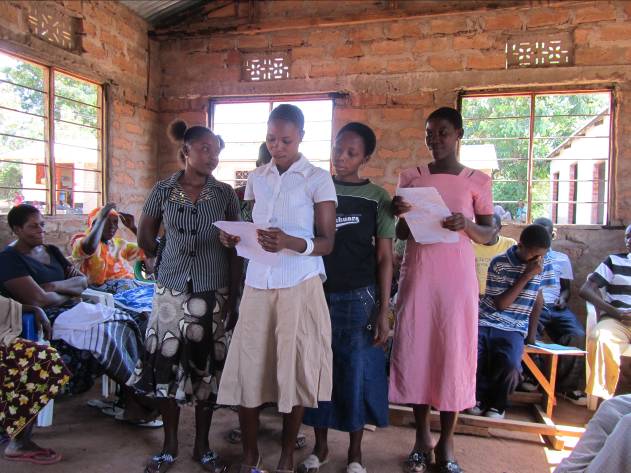Gender Equality Mainstreaming Digest – The April 2016 Issue
Here are the highlights of this month’s Gender Equality Mainstreaming Digest! Click HERE for the full version.

Female youth providing a report at a village meeting in Tanzania. Photo courtesy of D. Ceplis.
Highlights:
Opportunities and Upcoming Events:
Visiting researcher position: CGIAR Gender and Agriculture Research Network Communications support – The visiting researcher will support the Communications and Knowledge Management Coordinator for the Gender Network and be responsible for generating, editing and curating content and special features, including social media for the gender network’s website and related online channels, with the aim of increasing the sites’ effectiveness in attracting and engaging with target audiences such as network members and donors.
L’Oréal-UNESCO for Women in Science Fellowships – The UN’s Educational, Scientific, and Cultural Organization (UNESCO) and L’Oreal co-sponsor doctoral and post-doctoral fellowships for women in science. The fellowships are organized by regions and countries.
Prize for Women’s Creativity in Rural Life – The Women’s World Summit Foundation awards this prize of US$1 thousand per laureate to honor women and women’s groups for exhibiting exceptional creativity, courage, and commitment to improve the quality of life in rural communities. Each year, WWSF awards the Prize to between 5-10 creative rural women and women’s groups around the world.
This Month’s News:
Women in Ag: Agriculture More Than Ever – This blog site includes a number of posts on women studying agriculture, women working in agriculture, communication tips and more.
Why Canada Needs an “Old Girls’ Club” – When Justin Trudeau appointed women to half of the positions in his first cabinet, crusaders for gender equality were elated. But the much-publicized move has yet to spark similar parity in corporate Canada; according to research by The 30% Club just over 20% of board-level roles in Canada are held by women. That’s a number Mary Lou Maher is working to change. A veteran of KPMG in Canada, she is fiercely committed to getting more women on the boards of Bay Street (and beyond). Maher spoke with us about why gender parity is so important in Canada’s boardrooms, what it will take to make it happen and the role an “Old Girls’ Club” will play in the process.
The challenge for women to smash the glass ceiling – It will take 151 years before the proportion of women in middle management is equal to men if it continues to rise as the same rate it did between 1987 and 2010 (approximately 4 per cent). As part of the Globe Careers Leadership Lab series, Marina Glogovac, discusses some of the challenging she faced in her career, breaking the glass ceiling in corporate Canada.
Empowerment of Women Will Be Central to Realising Sustainable Global Development – Mary Robinson, former president of Ireland, (1990-1997) and former United Nations High Commissioner for Human Rights (1997 to 2002) comments on the SDGs and gender quality.
Reports Publications and Resources:
The Fight for Equality in Farming – Food Tank, CARE International, and the CGIAR Research program on Climate Change, Agriculture and Food Security recently released a report that shows how inequality determines who eats first and who eats worst, as well as how this shapes people’s ability to adapt to climate change. The report suggests that solutions around food production are not enough, and it demands more dialogue and action to address inequality in food systems. There are many inspirational organizations working to advance this dialogue, amplify women’s voices, and support women farmers around the world. Refer to the link to read how some of these amazing groups are advocating for equality in agriculture.
Gender, agriculture and water insecurity – Policy and program implementation for water insecurity must consider social norms around gender and other drivers of inequality. Too often, policies and programs on agricultural water management are gender blind and don’t consider women’s unique needs and experiences. This paper explains how and why improved water management on the farm matters for women and girls, and what can be done to better support opportunities for them, as well as for men and boys, in the face of climate change.
The Gender Equality Mainstreaming (GEM) Working Group of the Agricultural Institute of Canada gathers information and articles on an ongoing basis on gender quality mainstreaming within agriculture, scientific research, rural development, climate change, organizational development and international development. The views and opinions presented are not necessarily representative of AIC.
Back issues of the GEM Digest are available here.
